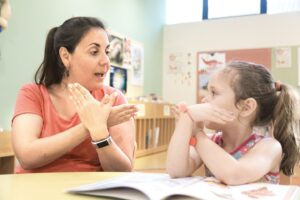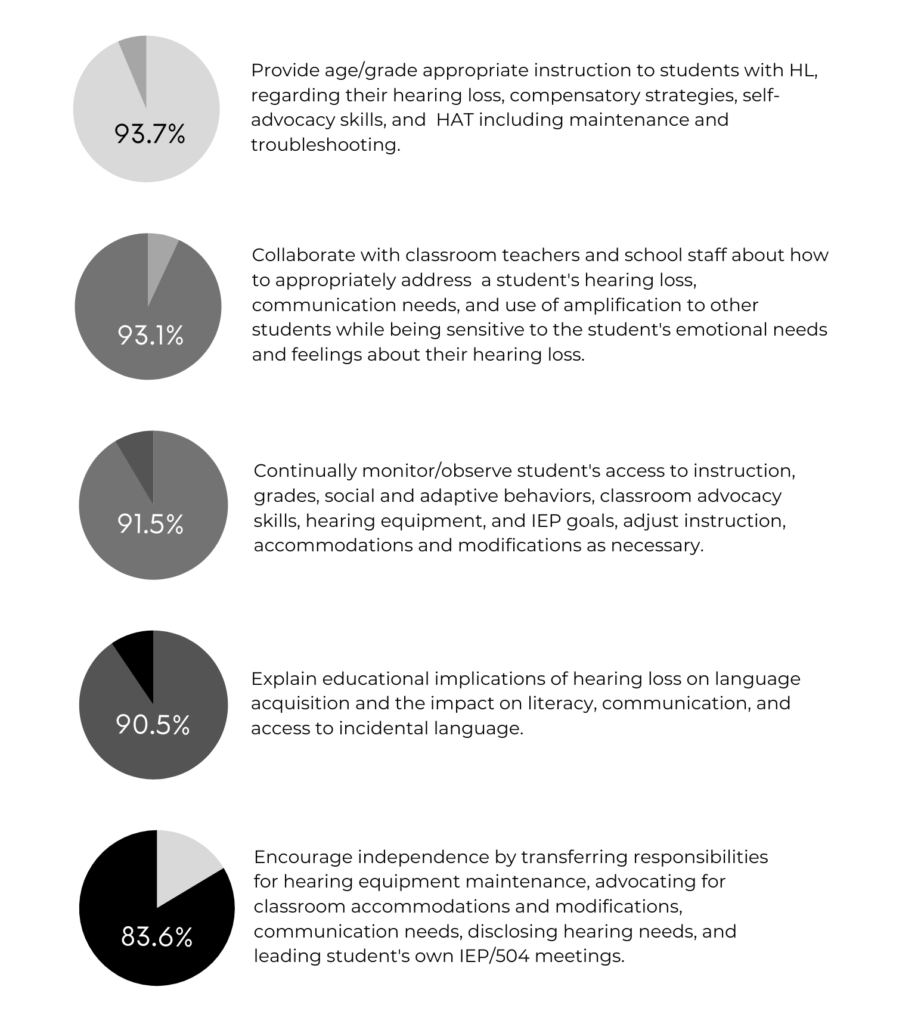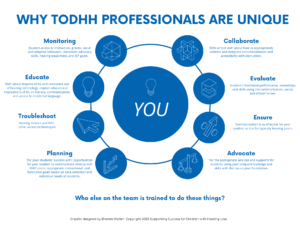Related Products
For Professionals
- Amplification
- Assessment of Student Skills, Challenges, Needs
- Early Childhood: Infants, Toddlers, Preschool
- Hearing Loss – Identification, Impact and Next Steps
- IDEA Law Summary Information
- Language and Speech Development Issues
- Legal Issues in Serving Children with Hearing Loss
- Listening (Auditory Skills) Development
- Planning to Meet Student Needs
- Self-Advocacy Skills for Students with Hearing Loss
- Self-Concept: How the Child with Hearing Loss Sees Himself
- Social Skills
- Speech Perception & Learning
Related Teacher Tools Takeout Items
Why a TODHH?

What can the Teacher of the Deaf and Hard of Hearing do that other Support Personnel can’t?
If you have been a Teacher of the Deaf and Hard of Hearing (TODHH) for any length of time, you’ve likely been asked the question, “What can you do that the “fill in the blank”(reading specialist, speech therapist, special education resource personnel) can’t?” or “What are you offering this student that my own campus personnel are not already providing?”
As a young teacher, new to the job, I was blindsided with this question in front of an IEP team, and I floundered. The tone in my answer was not confident, my reasons were weak, and I felt as if I was a witness for the defense being grilled by the prosecution on a question I wasn’t prepared to expect, much less answer.
This question often surfaces when a student is doing one or more of these things: 1) making passing grades; 2) has a few class acquaintances; 3) can turn his/her head when name is called; 4) can respond to a to a routine question such as “How are you?” ; or 5) has good articulation when speaking. These are not the only reasons why there is apprehension to include a TODHH; you may have seen others.
So, what is your response?

As trained and skilled professionals in Deaf Education, it is important for our working relationships and to the students we serve or potentially serve to be able to answer “Why is a TODHH needed?” with confidence. We become the educational advocate for the student and ourselves the moment we speak. Whether asked by a genuinely interested member of the IEP team, or by a cynical one, we all need to have a plan for how to answer succinctly and confidently.
Appropriate responses should be based on good data, qualitative and quantitative, presented thoughtfully and confidently when making the case to others that services from a TODHH are (or are not) needed. Shining the light on services in the context of what is mandated by law for students with hearing loss is also important, as many non-DHH educators may not realize the nuances of how special education law applies to appropriate service decisions for our students.
Certainly, services provided by educational professionals may overlap, but only a trained Teacher of the Deaf and Hard of Hearing is sufficiently prepared to, explain, and educate others on the impact of hearing level differences on a student’s functional and/or academic performance.
Presenting your “argument:”
This is what a Teacher of the Deaf and Hard of Hearing is trained to do that other staff members are not:
- Educate school staff regarding the impact of a hearing level difference on a child’s language acquisition, social skills, and learning.
- Plan appropriate instruction to decrease the language andlearning gap that may exist using strategies specific to teaching students who are d/Deaf or Hard of Hearing.
- Provide specially designed instruction for a student who is Deaf or Hard of Hearing.
- Administer specific and appropriate testing, formal and informal, tailored to the vulnerabilities of students who are deaf and hard of hearing as mandated by law, related to how the child functions using his/her residual hearing and/or mode of communication.
- Interpret test results using a d/Deaf lens and explain the assessment results to the IEP
- Recognize needs specific to a child with hearing loss that may go unnoticed by personnel who are not trained in this low-incidence category (i.e., pragmatic language, phonological awareness, syntax, etc).
- Work with the team to plan accommodations, including hearing technology, captioning, etc. to ‘level the access playing field’ as required by ADA.
- Assist teachers, parents, and students in managing hearing technology and knowing when to refer to the student’s audiologist.
- Prepare other professionals on effective strategies when working with a student who is d/Deaf or Hard of Hearing in the classroom, cafeteria, bus, outdoors interactions, assemblies, bullying by peers, etc.
- Understand the social-emotional impact a hearing level difference can have on a student and work to create opportunities for the child that include other DHH students.
- Understand and develop student’s skills related to expanded-core curriculum such as self-advocacy, communication repair, and learning about their hearing ability and hearing devices.
- Know and/or create accommodations and modifications that work for student; monitor the effectiveness of those accommodations and modifications.
These are just a few of the skills that TODHHs use every day to work with students who are d/Deaf or Hard of Hearing. See more information here: Why Involve the Teacher of the d/Deaf and Hard of Hearing, a 2-page handout designed to be shared with other educators and families.
What have you said about the specific nuances of your duties as a TODHH?
According to a survey of 317 Itinerant Teachers of the Deaf and Hard of Hearing conducted by Supporting Success for Children with Hearing Loss in April 2022, five top priorities were identified by YOU:

![]()
Your training and experience makes you the professional who knows how to collect data, find answers, and carry out the individualized program of instruction your student(s) need.
Advocate for them!
Relevant Law for the TODHH – IDEA, Sections 300.89(c)(3) and 300.89(c)(5) state:
Deafness means a hearing impairment that is so severe that the child is impaired in processing linguistic information through hearing, with or without amplification, that adversely affects a child’s educational performance.
And
Hearing impairment means an impairment in hearing, whether permanent or fluctuating, that adversely affects a child’s educational performance but that is not included under the definition of deafness in this section.
Notice the phrase, “…adversely affects a child’s educational performance” in each of these definitions. This section does not read, “…adversely affects a child’s academic performance.”
Are academics part of a child’s educational performance?
Is participation in school events a part of the child’s educational performance?
Is participation in extra-curricular activities a part of the child’s educational performance?
Is learning to make friends and be a part of a group a part of the child’s educational performance?
Is learning practical skills such as visiting the school nurse or counselor, communicating with teachers, navigating the school campus, and following the school rules part of the child’s educational performance?
YES!
Though many of the skills outside academics are not required, they are the intangibles that underpin a child’s overall educational success – and Teachers of the Deaf and Hard of Hearing know that.
Teachers of the Deaf and Hard of Hearing are educators and advocates for students. If the data collected supports your involvement in a child’s educational performance, present it with confidence.
For more information we recommend:
- Role Comparisons: Supporting Students Who are Deaf or Hard of Hearing
- Complete 2022 Survey Results
- Resources for Identifying DHH Student Needs: Eligibility Assessment and Beyond
- Legal Issues
- Why Involve the Teacher of the Deaf?

